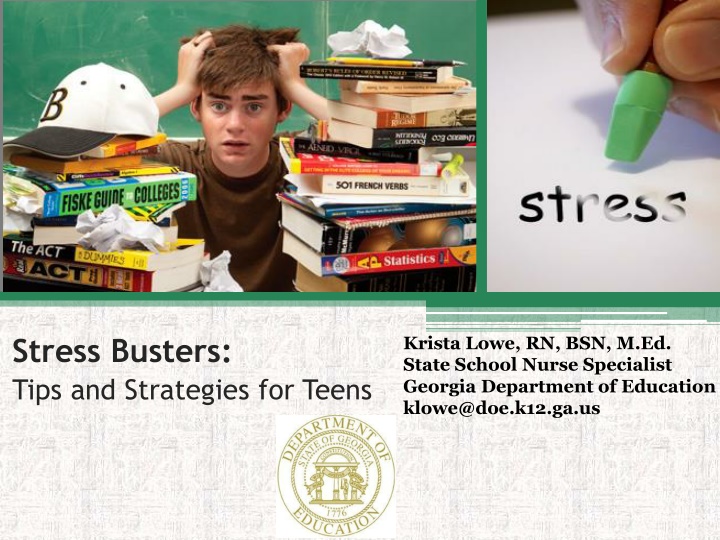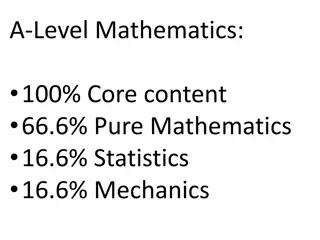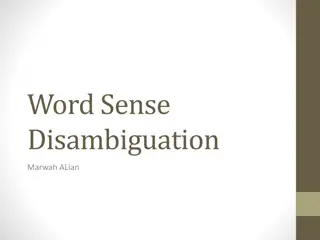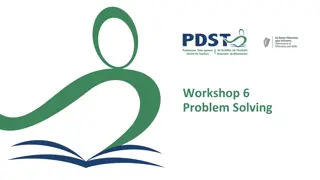Challenges and Approaches in Mathematics Education
Delve into the complexities of organizing mathematics education, covering topics like number properties, algebraic expressions, geometric shapes, and statistical analysis. Understand the significance of involving mathematicians, utilizing precise language, and addressing various mathematical concepts effectively.
Download Presentation

Please find below an Image/Link to download the presentation.
The content on the website is provided AS IS for your information and personal use only. It may not be sold, licensed, or shared on other websites without obtaining consent from the author.If you encounter any issues during the download, it is possible that the publisher has removed the file from their server.
You are allowed to download the files provided on this website for personal or commercial use, subject to the condition that they are used lawfully. All files are the property of their respective owners.
The content on the website is provided AS IS for your information and personal use only. It may not be sold, licensed, or shared on other websites without obtaining consent from the author.
E N D
Presentation Transcript
Stress Busters: Tips and Strategies for Teens Krista Lowe, RN, BSN, M.Ed. State School Nurse Specialist Georgia Department of Education klowe@doe.k12.ga.us
Objectives Following completion of this training, you will be able to: Define stress and the various types of stress Identify sources of stress Evaluate sources of stress in your life Identify positive strategies for coping and managing stress
What is Stress? How would you define stress? Stress can be defined as make you feel threatened or upset your balance in some way a normal physical response to events that Basically the point when things appear to be too much to handle
StressDoes this really apply to me??? Many medical and health organizations have conducted studies on teen stress and found the following The American Psychological Association found that: 49% of teens reported having experienced stress 43% of these teens reported experiencing fatigue, headaches and other physical ailments 39% of teens admitted that stress negatively impacts their eating habits
More than one type of stress Yikes?! Did you know there are different types of stress? The three types of stress include: Environmental Physical Psychological
Environmental Stress What is Environmental Stress? Stressors that are found in our surroundings are called environmental stressors. Everyday life is full of environmental stressors that cause minor irritations. What are some examples of Environmental Stress you can come up with?
Environmental Stress Examples of Environmental Stress Extreme Temperatures Crowding Noise
Physical Stress What is Physical Stress? a biological response to factors which can negatively impact your overall health What are some examples of Physical Stress you can come up with?
Physical Stress Examples of Physical Stress Inability to Sleep Stomach Problems Chest Pain
Psychological Stress What is Psychological Stress? a biological response to factors which can negatively impact your overall mental and emotional health What are some examples of Psychological Stress you can come up with?
Psychological Stress Examples of Psychological Stress Relationships Deployment Loss
StressorsWhat are those? Stressors are defined as stimuli that cause stress Basically those things that cause you to get stressed out Stressors can be both positive or negative depending on the event or situation
What are your stressors? All of us have things that cause us to feel more stressed; those things that cause our hearts to pound, palms to sweat and butterflies in our stomach. What are some stressors in your life?
What other teens have to say about stress Often times we can feel alone when dealing with our stress. Many teens report experiencing stress in their everyday lives. Listen to what other teens have to say about causes of their stress and what they do to cope with things. Watch: Teenagers and Stress video https://youtu.be/WuyPuH9ojCE https://youtu.be/v-t1Z5-oPtU
Physical Reactions to Stress Since stress is a natural biological reaction, when we experience stress we may also experience physical symptoms. Physical reactions to stress can include: Headaches Sleeplessness Stomachaches Loss of Appetite What are some other physical reactions you can think of?
Emotional Reactions to Stress Just as our bodies experience physical reactions to stress, we can also experience emotional reactions. Emotional reactions to stress can include: Depression Increased Fears/Worry Difficulty Concentrating Greater Anxiety What are some other emotional reactions you can think of?
Questions to determine if you are in danger of stress overload: Have you recently gone through a traumatic event such as a move, death of a loved one, major relationship change? Are you frequently teased or are you overscheduled with your activities? Have you experienced any of the listed physical symptoms (i.e. headaches, tired, low motivation)? Have you been emotionally out of control (i.e. extreme anger, sadness, or hopelessness)?
Stress in Others: Warning Signs Everyone is impacted by stress at some point in their day week life. Being able to recognize stress in others can help us as we learn to communicate with them, collaborate with them and help them. Those around us may exhibit the following signs of stress: Being very quiet/withdrawn Easily aggravated or quick to anger Oversight of assignments, tasks and/or duties Appearing to be very worried or anxious Crying or having feelings of hopelessness Complaints of headaches, stomachaches or general tiredness
Team Activity Now that we have a better understanding of the physical and emotional impacts stress has on our lives, your mission is to work as a team to create a poster or visual representation of what stress looks like to you. Some things to keep in mind as you work: 1. This is a TEAM activity everyone participates 2. What do I feel like when I am stressed? 3. What do I look like when I am stressed? 4. Once every group has finished, we will share with the other teams
Stress: It Wont Control Me! Since avoiding stress is not practical in life, learning positive stress management strategies allows us to cope with stress. -> Managing our stress, not our stress managing us!
How do your peers cope? In this next video, you will see how teens can implement positive stress management strategies to cope with things in their lives. Watch: Stress Management Strategies: Ways to Unwind https://youtu.be/0fL-pn80s-c
Stress Management Strategies There are many positive strategies for managing stress. Some of those strategies include: Exercise regularly (at least 60 minutes of moderate activity each day) Get proper amounts of sleep (est. 8-9 hours each night) Eat healthy Avoid illegal drugs, alcohol and tobacco Decrease negative self-talk Learn to accept compliments; feel proud of achievements Set goals break tasks into smaller segments Don t be afraid to walk away and take a breather during challenging situations Find a trusted individual to talk with Utilize deep breathing and positive mantras: I can handle this or I will not let this get me down
Stress: Lifelines for Others In addition to practicing our own positive stress management techniques, we can also help others experiencing stress by: Encouraging them to talk about things Suggest they listen to their favorite music Recommend they help others; volunteer to help others Encourage them to eat healthy and get plenty of exercise Partner up with each other and work on fun projects or activities What additional strategies would you suggest?
Session Take-Aways Stress is something everyone experiences in life while we can t escape it, we CAN learn to positively manage it. Important things to remember include: Stress is a normal, biological function Stress can be positively managed with practice and persistence Everyone reacts differently to stress that is okay Being proactive, living a healthy lifestyle and learning to accept those things we cannot change are all examples of positive stress management strategies
Objectives Did we cover our objectives? Define stress and the various types of stress Identify sources of stress Evaluate sources of stress in your life Identify positive strategies for coping and managing stress
Questions What questions are there at this time?























